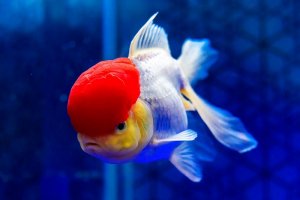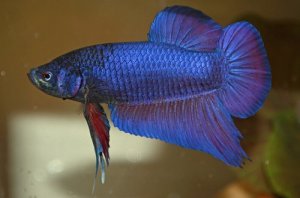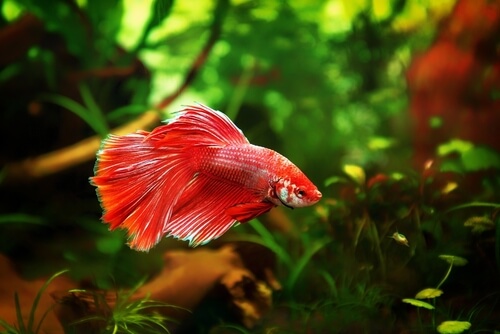
One of the prized possessions that can be found in any aquarium is the betta fish. It is noticed for its elegant swimming and lively colors. With freely flowing fins and gorgeous gills, male bettas are certainly the more outstanding of the species. As a fish owner, you’re doing your aquarium a favor by introducing these lively tropical swimmers. However, from time to time, you may experience your betta fish not moving.
Raising a betta comes with its fair share of headaches and highlights. Like most tropical fish, they need warm temperatures to survive. Bettas also have an interestingly diverse set of sub-types within the species. Wild bettas tend to look quite different from the domesticated variants.
Domesticated betta fish seem to have a shorter lifespan as they live between 3-5 years. So, unfortunately, they won’t last as long as other Cichlidae fish, such as the discus, but are certainly still worth keeping.
Why Is My Betta Fish Not Moving?
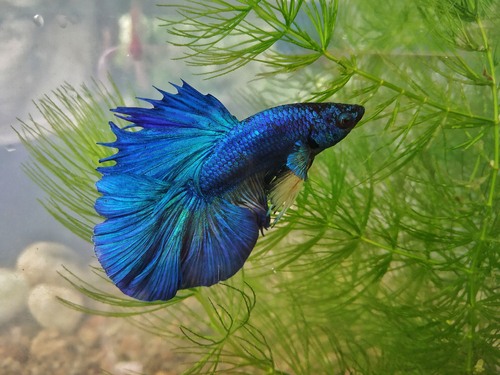
Owning a betta fish comes with anxiety-inducing moments where you notice something off about their behavior. One of the possible surprises with a betta fish is a lack of movement. When you check on your tank and suddenly notice that they are immobile, many thoughts can begin running through your head. That moment of panic is something you’re probably dreading.
If you’re ever dealing with a betta fish not moving, this article compiles some of the reasons why. We’ve also provided tips on what to do if you run into any of these scenarios.
1. Your Betta Fish May Be Asleep
It’s probably the most likely explanation behind your betta’s immobility. All living beings in this world need time to rest, which is the case with fish. So when a betta decides it’s time to recharge, it can simply hover at the bottom or float in a spot, probably looking unnatural.
The reaction you’re looking for is some movement. When your fish is inactive, you can try disturbing the flow of water close to it. This way, you can get a good view of whether or not it is asleep. Sure, giving a fish a rude awakening is cruel. But getting it to jump as a sudden reaction might be the best indicator that your betta just needed some shuteye. Of course, as your pet ages, you will find it sleeping more.
2. Unfavorable Tank Temperatures
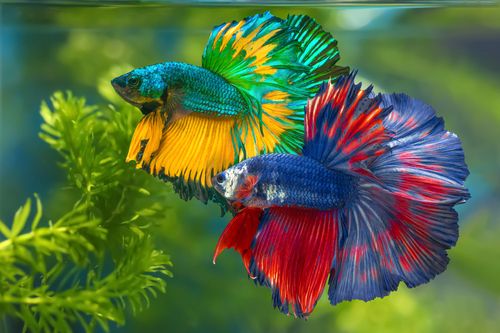
Water parameters are an essential thing to learn when caring for tropical beauties. Bettas are very particular about the type of water they require. On top of their native climates, they also possess a unique oxygen intake method that is highly affected by the water quality around them.
One of the most unpredictable causes of betta fish death has to be the water conditions of your tank. Your betta fish not moving might be a sign of a bigger problem. The water in a tank can be too hot for betta’s standards. Hot water can cause temperature shock resulting in an immobile betta. In that case, immobility is a clear indication of a life-threatening problem.
Even the opposite temperature conditions threaten betta’s health. If the tank is too cold, a betta stops swimming, and the metabolic system of the fish immediately begins to shut down. Regular body functions cannot carry on, and its appetite is completely ruined.
Watching out for temperature fluctuations isn’t difficult with the right equipment. So you don’t need to worry about this problem if it ever arises.
Install a tank thermometer and regularly check on it to be on the safe side. Some digital aquarium thermometers can provide alerts when conditions are above and below the average parameters you’ve set. For bettas, temperatures between 76 to 82 degrees Fahrenheit are completely fine.
Temperature conditions within your living space can significantly affect how hot or cold the tank gets. So it’s best to keep your aquarium in a spot that isn’t too susceptible to these changes. One of the causes of betta fish illness can be traced down to poor water parameters, so take your temperature checks seriously! If it seems out of control, consider installing a heater in the room, especially during winter.
3. Poisoning
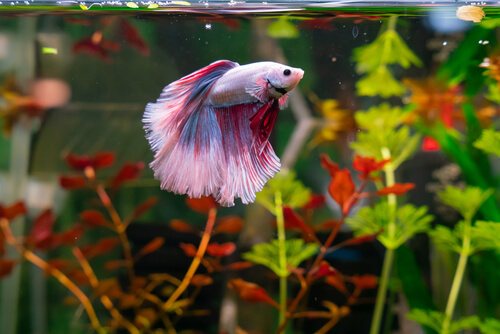
Unfortunately, when a tank possesses high levels of ammonia, nitrite, or nitrate, chances are high that your betta fish not moving is related to these properties. As indicated earlier, finding a good balance in water parameters is essential to succeeding in keeping bettas happy. When your water pH is at an optimum level, along with the temperatures, it’s a fair sign that your bettas are doing well.
If these substances are poisoning your fish, you will need some quick reactions to keep it alive. The one thing you should try to avoid is worsening the condition of your betta. One of the most common causes of betta fish illness is a sustained lack of action after noticing the initial symptoms.
For example, suppose it is lying at the bottom of your tank, not feeding, and unusually idle. In that case, it’s time to test your water for these substances.
On average, ammonia levels in a 20-gallon aquarium should sit below 0.25 ppm (parts per million). If the recorded levels are above this, you may be dealing with one of the most dangerous causes of betta fish death. Similarly, nitrite levels in your water should be less than 0.5 ppm. As for nitrate, aim for levels lower than 25 ppm.
The best way to keep these numbers down is with an effective filtration system installed in your tank. Once you’ve set it up successfully, there’s a high chance that you’ll be able to detect a problem faster in the future.
4. Poor Feeding Practices
Unlike discus fish, bettas are predominantly carnivores. Therefore, you could be driving one of the top causes of betta fish illness by feeding it the wrong type of food. Unlike most tropical freshwater fish, they tend to enjoy eating proteins and have no stomach for aquarium plant life.
Suppose they are eating the wrong types of foods. You will likely have a fish with an upset stomach leaving your betta without any energy to move around.
A betta fish not moving can occasionally be related to its diet. Be sure to respect its diet preferences, regardless of your previous knowledge of bettas. Carelessness causes betta fish death, so it’s important to avoid making expensive mistakes.
With a carnivorous diet, you have the task of supplying them with the best quality food, such as worms, brine shrimp, insect larvae, and other recommended foods available at your local aquatic pet store. Also, be wary of overfeeding your betta. You don’t want to deal with swimming issues from your betta over-eating and failing to digest food.
5. Swim Bladder Disease
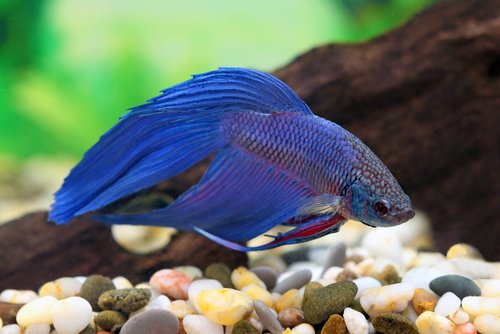
Swim bladder disease is one of the most common symptoms among fish with poor diets. It causes a rapid decline in the swim bladder’s functions, making it difficult for a fish to maintain balance while in the water. If your betta fish is not moving, its swim bladder may be affected by this problem.
The swim bladder is usually meant to help with maintaining buoyancy, help with respiration, navigation, and even fish communication. Without it, your pet is actively facing one of the causes of betta fish death.
In bettas, swim bladder disease usually results from overfeeding, leading to constipation. There is an easy way to tell if your inactive betta fish is struggling with this disease. When observing it in the aquarium, look at its abdomen for signs of swelling or a bulge. If this is clearly shown, you’ll need to begin taking the right steps to resolve it.
Performing a water change is your best bet to prevent it. As a solution for an active case of this disease, it might be time to leave your fish unfed for three days. After the period of fasting, you can feed it a boiled pea, inducing the removal of any excess food and clearing its digestive organs.
6. Poor Lighting Conditions In The Tank
When a betta is kept in a poorly lit tank, chances are high for general laziness from your fish. It is a funny way to end up with this problem, but a reality nonetheless. Adjusting the lighting of your tank should work effectively as a quick fix for this betta problem. An inactive betta is likely just assuming that the darkness means night-time.
Those instincts are hard to change in one generation, so you should just upgrade lighting fixtures and encourage more activity in the tank. A betta not moving for prolonged periods can have long-lasting effects on its health.
7. Betta Might Be Dead
The dreaded answer. A betta fish not moving may not always be an instant death sentence, but unfortunately, it is possible. Like all living things, bettas don’t get to live forever. Most of them tend to live for three years before ending the adventure they had as your pet.
So if yours isn’t moving or responding to anything you’re doing, you could have a dead fish on your hands. This type of scenario is never ideal but is inevitable.
Don’t be quick to toss it in the trash. Instead, look for signs of life first, such as the gills moving or slight movements when you nudge it. The gills are the best location to observe before deciding on their condition.
Tips To Keep Your Betta Fish Moving
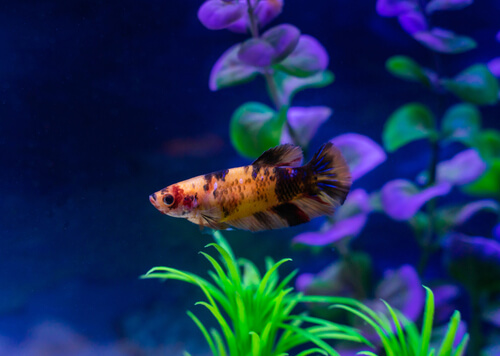
It can be a demoralizing sight to watch your pet become immobile. To help it out, you should regularly:
- Change at least 50% of the water in your tank weekly
- Install a thermometer and water filter in the tank to regulate water parameters
- Stick to a healthy and varied diet for your bettas
- Quarantine the immobile betta and closely inspect its body for signs of disease
- Enlist the help of an experienced and specialized veterinarian
- Regularly educate yourself on betta fish care
Bottom Line
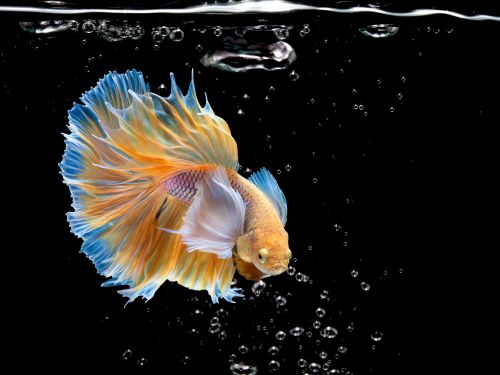
The betta fish is a fun species to have in your aquarium. However, it is saddening to watch your betta fish not moving. Be sure to react quickly and with care if you’re ever faced with any situations covered here. Also, regularly make an effort to check on the fish in your aquarium because prevention is better than cure.


